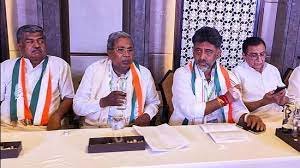The Congress Legislative Party (CLP) meeting held in Bengaluru on Sunday evening was initially expected to revolve around the claims of former chief minister Siddaramaiah and the party’s Karnataka unit chief DK Shivakumar regarding the state’s top elected post. However, the gathering quickly transformed into a complex four-cornered power play, as members representing the Lingayat and Scheduled Caste (SC) communities also began advocating for the chief ministership to be granted to someone from their respective communities.
The CLP meeting, which was eagerly awaited by political observers and party members alike, took on a new dynamic as demands for greater representation and inclusivity emerged from different sections of the Congress party. Traditionally, the chief ministerial post in Karnataka has been held by leaders from the Lingayat and Vokkaliga communities, which are influential and numerically significant in the state’s political landscape.
Former chief minister Siddaramaiah, who is a prominent leader from the Kuruba community, put forth his claim for the chief ministership, asserting his experience and leadership credentials. Siddaramaiah, known for his tenure as chief minister from 2013 to 2018, enjoys substantial support within the party and has been a key figure in Karnataka politics for several decades.
Meanwhile, DK Shivakumar, the Karnataka unit chief of the Congress party, also staked his claim to the top post. Shivakumar, a prominent Vokkaliga leader, highlighted his organizational skills and his ability to mobilize support within the party as his strengths. His supporters argue that a Vokkaliga leader should be given the opportunity to lead the state, considering their significant presence and influence in southern Karnataka.
As the meeting progressed, representatives from the Lingayat and SC communities put forward their demands for a chief minister from their respective backgrounds. The Lingayat community, one of the largest and politically influential communities in Karnataka, emphasized their long-standing support for the Congress party and asserted that it was time for a chief minister from their community to be appointed. They argued that such an appointment would strengthen the party’s prospects in the upcoming elections and would be a significant step towards social justice and inclusivity.
Similarly, members representing the SC community also made a strong case for their community’s representation in the chief ministerial position. They argued that the Congress party, known for championing the cause of social justice and marginalized communities, should prioritize the appointment of a chief minister from the SC community to demonstrate its commitment to these ideals.
The four-cornered power play at the CLP meeting reflects the complexities and challenges faced by the Congress party in Karnataka. Balancing the aspirations and demands of various communities while also considering political viability and electoral prospects will undoubtedly be a daunting task for the party leadership.
The outcome of the meeting remains uncertain, as the party leadership navigates through these competing claims and attempts to find a consensus candidate for the chief ministerial post. The decision will likely have far-reaching implications for the Congress party’s future in Karnataka, as it seeks to regain political dominance in the state.
What was anticipated to be a discussion centered around claims from Siddaramaiah and DK Shivakumar for the chief ministerial post in Karnataka turned into a four-cornered power play, with members representing the Lingayat and SC communities demanding representation for their communities as well. The CLP meeting highlighted the complexities of balancing community aspirations and electoral considerations within the Congress party, as it grapples with the task of selecting a candidate who can unite various factions and lead the party to success in the forthcoming elections.


